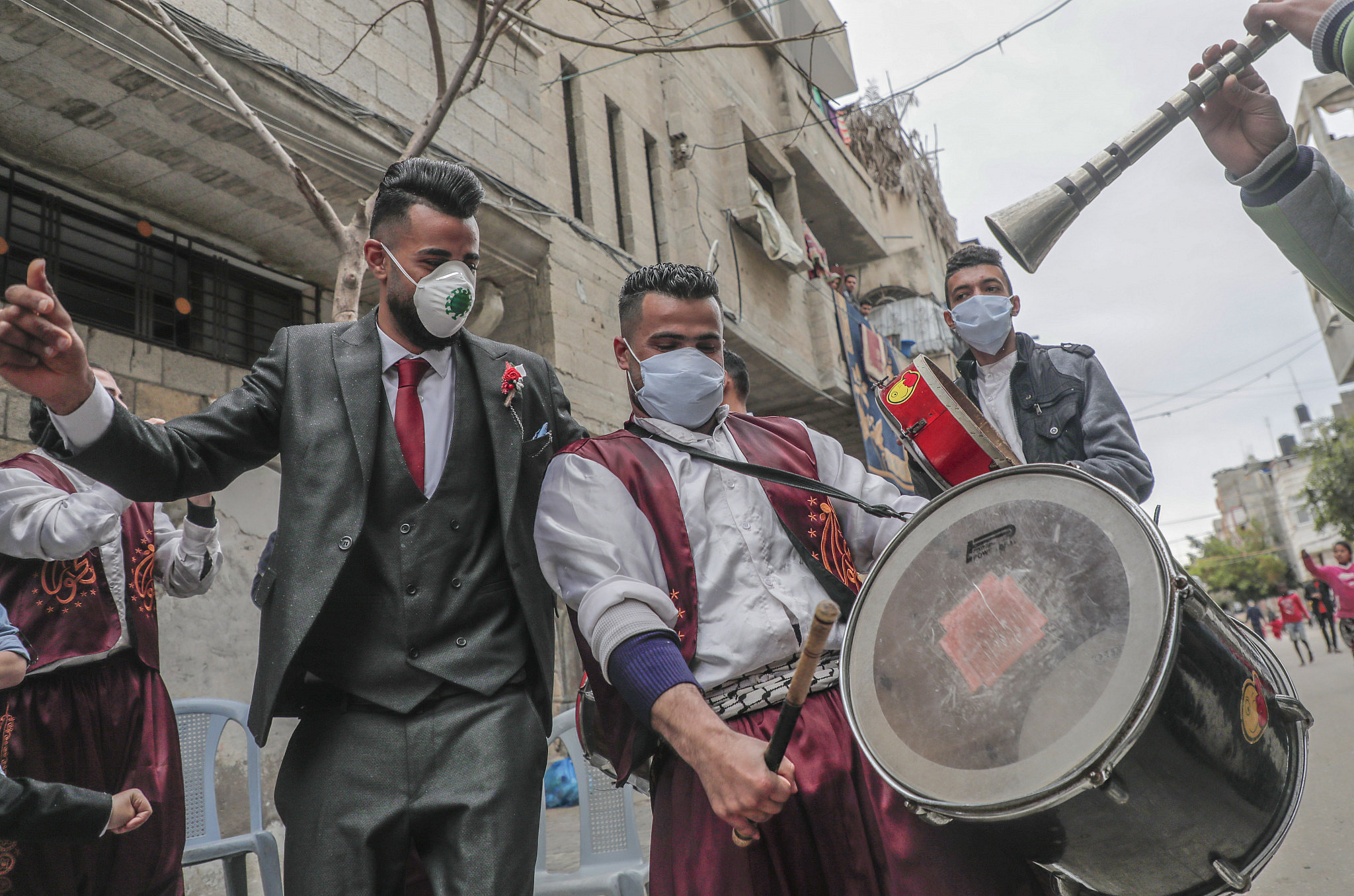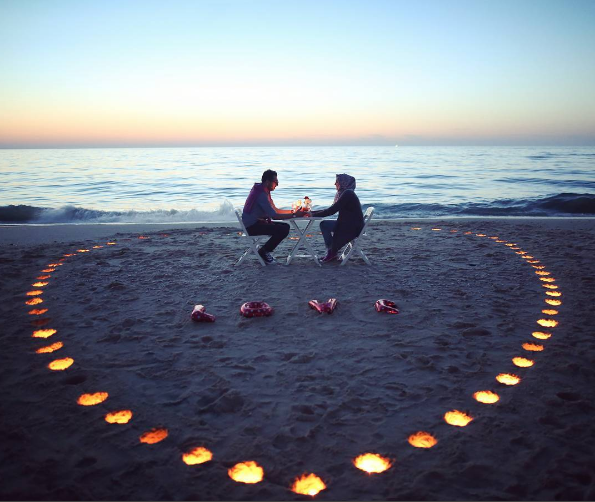
Since the Israeli blockade of Gaza caused the strip’s economy to implode and youth unemployment to soar, marriage has become increasingly just a dream for young men, whose families must shoulder the cost. They long for a way to lessen the burden, but traditions are hard to change.
Nowadays, though, relief is coming from a surprising source: the coronavirus pandemic. Wedding halls have closed and finally, it’s acceptable to settle for a small and simple home party instead of the traditional large, elaborate celebration.

The expensive marriages of today are relatively new. In the 1980s and earlier, people in Gaza typically had simple weddings in their homes, with balloons as decorations. The groom and a few relatives walked to the bride’s house, where lunch was served, and the wedding ceremony conducted. One of the women played a drum and sang, with the others in attendance singing along and dancing.
However, over time, it has become common to rent a wedding hall and cater a full meal for guests. Hundreds of relatives, neighbors, colleagues and friends are invited. The groom hires a drummer and band for a zaffa, a musical procession that marches to the home of the bride and then to the wedding hall. The day before the wedding, both the bride and groom hold separate, smaller parties in their homes or chalets; the day after, they serve breakfast for guests. The price tag: $4,000-$7,000, borne totally by the young grooms. And that’s not counting the Islamic mahr (bridal gift), which is paid to the woman’s family according to her education and social status, and often is almost as much as the wedding.
The economic crisis and the high cost of weddings has forced many young men to postpone getting married. According to Hassan al-Juju, head of the Supreme Judicial Council, the number of marriages in Gaza decreased by about 10% over the last three years. When the government closed all the wedding halls in mid-March, however, some young people saw an opportunity and seized it.
Wedding costs before and after COVID-19
Bahaa el-Dein, 22, earns $300 a month, working with his dad in their clothing shop. He was scheduled to be married on March 24, but instead of delaying it, he’s going ahead—at much less cost. At first, he wanted to throw a big party for his bride, Alaa Abu Ghuneima, 18. He rented a wedding hall, invited 500 guests and booked a restaurant—adding up to more than $2,500, in addition to the bride price of $4,000.
"At first, I felt so sad that our wedding preparations had to be cancelled,” he says. “But after deep thinking, I realized it could be good for me in this bad economy. I know it should be a special day for us, but I figured a simple, inexpensive wedding could be special too. And thankfully, it was wonderful and memorable.”
Bahaa’s and Alaa’s wedding party, which was held at home, was festooned with balloons and bright lights; they also brought in a wedding kosha (a divan-like “throne”), where the bride and groom sit. The number of invitees was reduced to 60 persons, and instead of a full zaffa, some of their relatives ululated (zaghareet in Arabic, a loud trilling sound) when they entered.
“This simple wedding cost me only $600,” he smiles. “I saved more than $2,000. There is so much we can do with that money.”

Some women long for ‘pomp and circumstance’
Palestinian journalist Ghalia Hamad posted on Facebook to encourage young men to use the opportunity to get rid of Gaza’s exhausting and expensive marriage traditions. However, not all females approve. They don’t want to give up their elaborate wedding parties.
Ahed Mahmoud, 37, earns $250 a month and became engaged to Doaa, 32, in early February. They planned to marry on April 7 and booked a hall for $500. To pay the other wedding costs, he went into debt by borrowing $1,000 from a close friend.
“The coronavirus destroyed those plans, but honestly, I didn’t feel sad,” Ahed says, noting the relief the savings brought him.
Yet, he faced difficulty with Doaa and her family; she wants to celebrate in a wedding hall with a zafaa, like other girls. Ahed attempted to convince her to go ahead, pointing out that no one knows when large gatherings will be allowed again. His attempts went in vain. He gave her family a week to think before their final refusal. During that week, he worried incessantly. Finally, they relented, convinced by the growing number of infections, brought in by returning travelers.
“I was afraid they would insist waiting for a big party,” says Ahed in relief. “I was able to reduce the wedding costs from $3,000 to $800 and avoid going into debt. Debt is a heavy burden; if we had borrowed money for our marriage, we would have had to reduce our expenses in other ways.”
What is better? Simple or fancy?

At least a few women in Gaza say they found beauty in their simple, inexpensive weddings, in spite of being initially reluctant to give up on their original plans.
Samah Moneer, 23, is one. She was engaged to a 26-year-old-lawyer, Mohammed Salem. Like other girls, Samah looked forward to wearing an elaborate white dress and watching the zaffa. But she decided other considerations were more important.
“What matters now is to be happy, and that means being with the one I really love and will keep loving for eternity,” she says. “My simple wedding brought joy and happiness into my heart and the hearts of my loved ones who attended.”
Like the other women in Gaza marrying amid the coronavirus pandemic, Samah and Mohammed celebrated their wedding with a few loved ones in the groom’s home. The informal party reminded Samah’s grandmother of her own wedding. She recalled: “In the morning, I went to a hairdresser, then my family brought me home to have fun with my relatives until my husband came and took me to his house, where I had my wedding. It was very simple: Women played the drums and sang, and some danced. The difference between my wedding and yours is that you have a stereo to play songs, instead of relying on our singing.”
This simple party cost about a third of what Mohammed would have had to pay for a formal wedding ceremony. And that was fine for Samah: “A few people attended our wedding, including loved ones, friends, work colleagues and neighbors—the people I most wanted to share the day, unlike big weddings with many people I don’t really know. I know it is hard for people to go against tradition, but when money is scarce, we must remember what is most important.”
What I believe

Gazan girls and their families should help men with these draconian marriage costs. Is it worth it to force them to go into debt to satisfy their brides or their families? Before Israel imposed its blockade on Gaza, decent-paying jobs were more plentiful. However, that is no longer the case, and yet the Islamic courts have not changed the expected mahr, giving girls and their families an excuse not to do so as well.
The other dynamic in this equation is the cultural norm that treats marriage as more of a transaction; love is expected to develop after the union is formed, not before. If love was allowed to grow first, between the man and woman, then the bride and her family would want the best for him and his financial situation would not the most influential determinant of his “suitability.”
These influences have caused many girls to refuse to marry guys just because the men can’t afford the costs. Two years ago, one of my male relatives, who works as an optometrist and earns $500 a month, married to a girl who had graduated with a degree in medicine and whose father works as a lecturer at the Islamic University. I was amazed that her family helped him furnish the couple’s apartment. What impressed me more is that her father accepted $5,000 as a bride price, despite the fact that female doctors normally get $10,000.
When girls join the labor market, they should not follow our inequitable marriage customs. In the past, women never worked outside their homes and their jobs were housework and childcare, with the men responsible for living costs. But now, many women have been able to secure jobs and thus, I think, should help with marriage preparations. If they can’t, due to their own lack of resources, they should not demand the same costly fees, etc.
Islam considers the “bride wealth” a gift from a groom to his bride; it shouldn’t be a punishment. It is time for the Islamic courts to recognize the shift in economic conditions and for girls and their families to consider marriage a partnership from the beginning.
What will I do? I will not stand by and watch the one I want to marry work day and night for our future. When the one I want to marry proposes, my family will probably ask for $7,000 as the bride price; I know my dad will insist. But I can on my own contribute half of that amount, secretly. I can contribute to the furnishing of our apartment. And I will surely skip the expensive wedding parties, for two reasons. First, I love simple weddings in natural places. Second, I want to reduce the oppressive marriage expenses. If my groom can afford it, we can spend the money on a honeymoon.
I have always believed that when I marry, my money is not only mine, but also my husband’s, and the same for his money. It’s time for a new era of equality between women and men.











